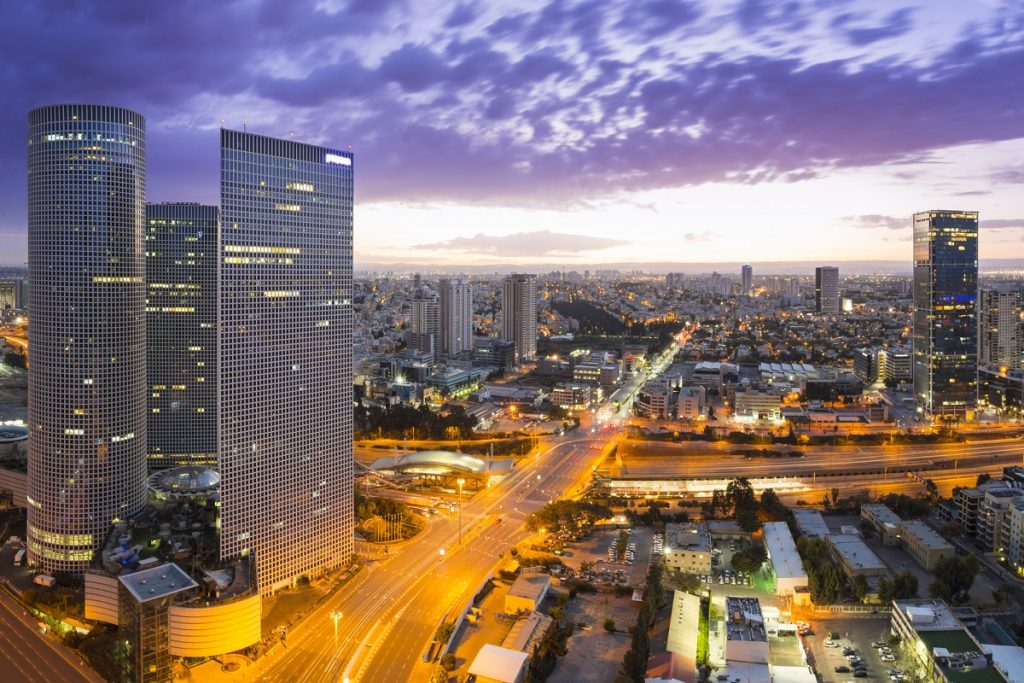Israel has the highest density of startups per capita in the world and its financial and tech capital, Tel Aviv, has long been home to a majority of them, drawing entrepreneurs to its unique urban vibes and vibrant technology and cultural scenes.
Tel Aviv has recently been ranked 18th in the Savills Tech Cities index of 2019, which measured 30 cities from across the world to establish which were the most successful environments for tech and startup companies. This is the third edition of the index by Savills, a global real estate company based in London.
The index looks at 100 individual metrics ranging from venture capital investment to the cost of a flat white coffee to the ease of mobility within the city, Savills said. These metrics were grouped into six categories: business environment, tech environment, city buzz and wellness, talent pool, real estate costs, and mobility, with each “weighted to reflect its importance to the tech sector.”
SEE ALSO: Report: Tel Aviv Among World’s ‘Heavyweight’ Tech Hubs
New York City topped the list, overtaking San Francisco, due to its “access to a deep talent pool and the city’s reputation as a global center of commerce.” San Francisco came in second, and London rounded out the top three as the “dominant tech hub in Europe, with three times more VC investment recorded in 2018 than the nearest European rival for VC investment, Paris.”
London was followed by Amsterdam, Boston, Singapore, Los Angeles, Austin, Stockholm, and Copenhagen for the top 10. Tel Aviv was nestled in 18th place between Beijing in 17th, and Dublin in 19th.
Tel Aviv’s highest ranking was in the talent pool category, which looks at “a city’s youthfulness, tech education credentials and ability to attract talent,” coming in 5th out of 30. Its lowest was in the business environment metric, measuring “investment environment, business costs and regulations, startup culture, R&D and innovation, and linkages with other cities,” where it came in 22 out of 30.
In the Buzz and Wellness category, which looks at factors such as pollution levels, crime, pay equality, entertainment, and cultural experiences on offer, Tel Aviv came in 21st.
Savills said in the report that all the cities in the index outperform other global centers, with “GDP across the 30 Tech Cities… forecast to rise by 36 percent in the next decade, against a rate of 19 percent across other developed cities.
Sign up for our free weekly newsletter
SubscribeAccording to the report, the rise of coworking spaces “has gone hand in hand with the growth of the global tech sector.” The expansion of such working environments was spearheaded by the Israeli co-founded shared spaces company WeWork, now valued at over $45 billion.
The Chinese cities on the list, including Beijing, Shenzhen (24th), Hangzhou (25th), Chengdu (26th), have risen the fastest, according to Savills, “and now account for a higher share of VC investment than their US counterparts.”
SEE ALSO: Tel Aviv Living, $20K Bonuses & Hebrew Lessons: Nexar Wants To Draw Tech Talent To Israel
These cities “have also emerged as leaders in shared mobility services,” but London nabbed the top spot in the mobility category “thanks to transport innovations and an urban form conducive to cycling and walking.”
In a previous Saville index in 2015, Tel Aviv came in 3rd in an index of 12 cities, after Austin, and San Francisco.
Last summer, a report by New York-based research firm CB Insights listed Tel Aviv as a “heavyweight” tech hub, and among the most influential and most international, with more foreign investors than anywhere else.
The report looked at 25 tech hubs around the world, comparing and contrasting their growth, and dividing them into three classes: “heavyweights,” including Boston, London, Los Angeles, New York, Silicon Valley, and Tel Aviv; “high-growth hubs,” such as Austin, Bengaluru, Beijing, Berlin, New Delhi, Paris, Seattle, Shanghai, Tokyo, and Toronto; and “up and comers,” including Amsterdam, Barcelona, Denver, Mumbai, Sao Paulo, Seoul, Stockholm, Sydney, and Vancouver.
CB Insights defined the heavyweight hubs as those with a higher concentration of later stage rounds, stable growth rates, and a higher density of engineering hires.
Related posts

Editors’ & Readers’ Choice: 10 Favorite NoCamels Articles

Forward Facing: What Does The Future Hold For Israeli High-Tech?

Impact Innovation: Israeli Startups That Could Shape Our Future




Facebook comments